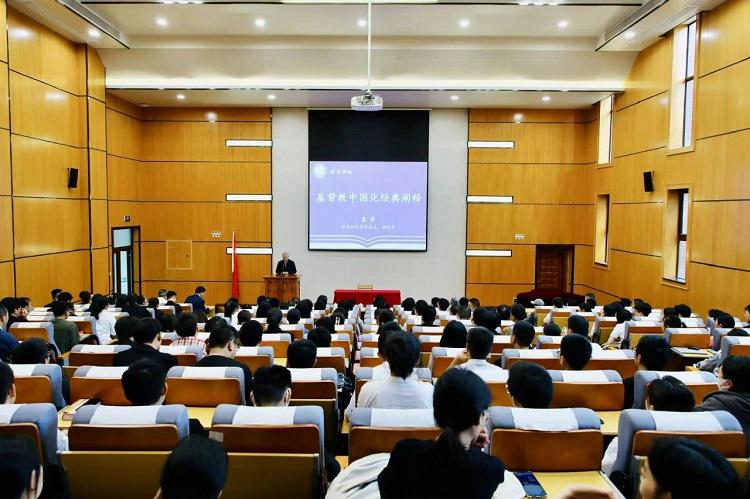Fujian Theological Seminary hosted a symposium on the sinicization of Christian classic interpretation.
According to the WeChat account of the SARA (China's State Administration for Religious Affairs), the Chinese Ethnic and Religious Culture Research Center of the Central Institute of Socialism organized this symposium on October 22.
Zhuo Xinping, honorary president of the Chinese Association of Religious Studies and a member of the Chinese Academy of Social Sciences, delivered a speech titled "The Intention of 'Sinicization' in the Translation and Interpretation of Christian Classics." He elaborated on the basis of sinicizing Christianity in the Bible, the practice of sinicizing Bible translation in the history of Chinese Christianity, and the direction of sinicization in Chinese translation of classics.
Rev. Wu Wei, president of the China Christian Council (CCC), reviewed the specific practices of localizing Christianity in the last five years of CCC&TSPM. In order to meet the needs of the time, he suggested that doctrines and rules be interpreted in line with the core values of socialism. This was the main idea behind growing Christianity in China and fitting in with socialist society.
Professor You Bin, director of the Institute of Religious Studies at Minzu University of China, talked about "One Person, One Text: Constructing Chinese Consciousness in the Bible Study." He mentioned that sinicized Bible translation and interpretation had shifted from "in itself" to "for itself" to align with the needs of Chinese Christians during the comprehensive innovation combining with Chinese culture. He advised establishing a comprehensive and systematic field of Chinese biblical studies, encompassing translation, interpretation, preaching, and application of the Bible, and integrating the construction of Christian ideology with Chinese characteristics.
Tang Xiaofeng, deputy director of the Institute of World Religions of the Chinese Academy of Social Sciences (CASS) and director of the Center for the Study of Christianity at the CASS, shared the thoughts and explorations of Tsu Chen Chao (a Protestant theologian) on the sinicization of Christianity. From the perspectives of cultural identity, social identity, role models, and tracing the origins, he conducted an in-depth analysis of the construction of the Beatitudes Theology in Fujian Province, providing recommendations.
Rev. Gao Ming, vice president of the China Christian Council (CCC) and president of the Fujian Provincial Three-Self Patriotic Movement (TSPM), gave a speech titled "Qi Lu Theology and Biblical Exegesis." He elaborated on the explorations of the Shandong CC&TSPM and Shandong Theological Seminary in the localization of Christianity from several aspects, including the background, the main content, the way of interpretation of the Qilu theological system, the construction of international discourse power, and the service of national diplomacy, stating that the goal of the sinicization of Christianity was to run the church effectively and serve society.
Dr. Yue Qinghua, vice chairman of the National TSPM and president of the Fujian Theological Seminary, delivered a speech titled "Beatitudes Theology: Exploring the Construction of a Sinicized Christian Theological Framework." He provided an interpretation of the Beatitudes Theology, discussing its origins, conceptual framework, insights from the Bible, theological interpretation, application, and vision, as well as the cultural background of the character Fu (blessings).
During the open discussion, Professor Miao Jianqing from Fuzhou University Zhi Cheng College and Associate Professor Zhang Yaoying from the Research Department of the Fujian Institute of Socialism said that the Chineseization of the interpretation of Christian classics should begin with the classics, look at important historical paths and contexts in the Bible, and combine Chinese and Western elements to help China's churches and Christians.
In the afternoon, participants engaged in on-site education activities in the Sanfang Qixiang (literally "Three Lanes and Seven Alleys") Historical and Cultural District, visiting the residences of Lin Juemin and Bingxin, as well as the She Ethnic Minority Hall.
- Translated by Abigail Wu












